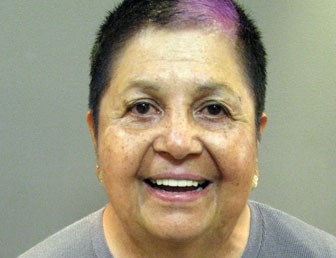Two of Canada's most lauded aboriginal lawyers were in the same room together this week in Prince George.
Mavis Erickson and Sharon McIvor were at the table with international human rights advocates, all concerned that the missing and murdered women of northern B.C. amounted to a systemic breakdown in need of federal government intervention.
One of those lawyers is local. Erickson has a background with both the Nadleh Whut'en (Fraser Lake) and Nak'azdli (Fort St. James) bands. She has a master of laws degree from Harvard (also attended UBC's law school), was the elected chief of the Carrier Sekani Tribal Council (CSTC) for six years and has a long-standing law practice in Prince George. She was, for a time, the province's Highway of Tears co-ordinator. Currently she teaches at UNBC and is the CSTC's appointed women's advocate.
"We want our women to be found, and we want the so-called justice system in Canada to start treating our women as human beings," Erickson said during meetings with delegates from the Inter-American Commission on Human Rights in Prince George, Thursday. "All of our girls are different than [serial killer Robert] Pickton's victims. They are spread out over time and place, there are many, many perpetrators, and they keep perpetrating because there is no meaningful response from the police and nothing to fear from the courts."
McIvor, from the N'kempmux First Nation in the Merritt area, was likewise pressing for a federal inquiry into why aboriginal women seem to be Canada's favourite target for violence. She has a long list of success at the national level, with multiple cases argued before the Supreme Court of Canada. She was involved in legality that changed disability rights in Canada, changed the rules for First Nations elections, added rape shield law for women, and more. The case that bears her name broke centuries-old gender barriers contained within the Indian Act.
"They call it getting 'McIvorized' now," when aboriginal women get the legal status they once were barred from, said McIvor. "But the bill [the government's amendment to the Indian Act following the Supreme Court ruling] doesn't go far enough, there is still residual discrimination going on, the federal government continues to ignore those problems, so I am now going international, the issue is before the United Nations human rights committee."
The implications go deeper than symbolic gestures, she said. The court cases are closing in on various levels of government and the Canadian taxpayer would be better served by dedicated government action rather that what she called a habit of stalling.
"There is no treaty for the Prince George area, for example. It is unceded territory. There are federal and international laws about that. They are very clear. If the territory is unceded, it still legally belongs in total to the First Nation of record. Here, that is the Lheidli T'enneh. The taxpayers keep sending their money to the municipality and the provincial government and eventually there is going to be a jolt when it is ruled that this money is being channeled inappropriately. It should be going to the First Nation. Land-use decisions could easily be overturned, tied up in court, companies sued for losses, if industrial activity happens on Lheidli T'enneh land without Lheidli T'enneh permission."
The Native Women's Association of Canada and Human Rights Watch are two non-govermental organizations that have been focused for years on the issue of treating the missing and murdered women as a sign of systemic discrimination - government-level discrimination - that fosters violence and injustice at the community level.
"The international community clearly recognizes the gravity of the situation, and the question is when the Canadian government will," said New York-based Meghan Rhoad of Human Rights Watch. "The half measures it has adopted are no substitute for a national commission of inquiry into the ongoing violence faced by indigenous women and girls and the development of a national action plan to assure their safety."
Rhoad called the visit by the Inter-American Commission on Human Rights contingent to Prince George, Vancouver and Ottawa "landmark" and "an important step toward accountability for decades of murders and disappearances of indigenous women and girls in British Columbia. Accountability is a necessity for the safe future of indigenous women and girls across Canada."



